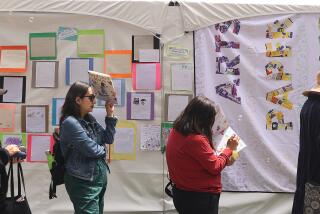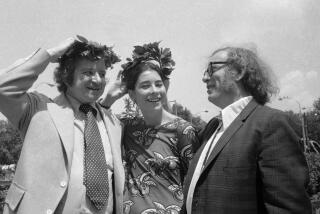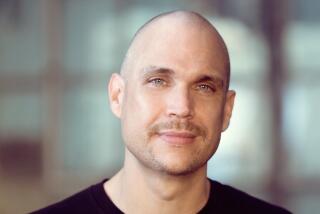Vance Bourjaily dies at 87; novelist, professor whose WWII experiences influenced early work
Vance Bourjaily, a novelist and professor of writing who was part of the post- World War II generation of writers whose wartime experiences influenced their early work, has died. He was 87.
Bourjaily, who was discovered by legendary editor Max Perkins, died Aug. 31 at Marin General Hospital in Greenbrae, Calif., after suffering a brain hemorrhage in a fall at his home in San Rafael on Aug. 18, said his wife, Yasmin Mogul.
An ambulance driver for the American Field Service in the Middle East and Italy before being drafted into the Army in 1944 and becoming part of the occupying forces in Japan after the war ended, Bourjaily caught the attention of Perkins at Charles Scribner’s Sons in 1946.
A play Bourjaily had written while in the Pacific landed on Perkins’ desk after Bourjaily sent the manuscript to his novelist mother, who passed it on to her agent.
Perkins read the play, then asked the agent if Bourjaily wanted to write a novel. The agent cabled news of Perkins’ proposal, which included an offer of a $750 advance for the book, to Bourjaily overseas.
“At that moment, I ceased to be a playwright and became a novelist,” Bourjaily recalled in an interview with A. Scott Berg for his 1978 biography “Max Perkins: Editor of Genius.”
Bourjaily made his literary debut in 1947 with “The End of My Life,” which Berg described as “a novel about a young man’s mental and moral disintegration during World War II.”
In his 1951 critical study “After the Lost Generation,” John W. Aldridge said “The End of My Life” was “the most neglected but, in many ways, the most promising” of the novels published soon after World War II.
“No book since [ F. Scott Fitzgerald’s] ‘This Side of Paradise’ has caught so well the flavor of youth in wartime,” Aldridge wrote, “and no book since [ Ernest Hemingway’s] ‘A Farewell to Arms’ has contained so complete a record of the loss of that youth in war.”
“ ‘The End of My Life’ made a real splash,” Berg told The Times this week, adding that he believes Bourjaily may be “the last survivor of the Perkins writers.”
“Most of Perkins’ discoveries were the great writers of the ‘20s and into the ‘30s, namely Fitzgerald, Hemingway and Thomas Wolfe,” said Berg. “But toward the end of Perkins’ life, Perkins was still banking on young, brilliant writers.
“Two of them were James Jones, who wrote ‘From Here to Eternity,’ and Alan Paton, who wrote ‘Cry, the Beloved Country.’ ”
And before Perkins died in 1947, Berg said, “he came across Vance Bourjaily.”
“Perkins was very much interested in World War II writers; he really saw World War II as the great new subject for novelists.”
In a long novel-writing career that encompassed a wide range of themes, Bourjaily continued to write until his death.
Among his other novels are “The Hound of Earth,” “The Violated,” “The Man Who Knew Kennedy,” “Now Playing at Canterbury,” “The Great Fake Book,” “A Game Men Play” and “Brill Among the Ruins,” which was nominated for a National Book Award.
From 1957 to 1980 Bourjaily taught at the University of Iowa Writers’ Workshop, where his students included John Irving and T.C. Boyle.
He taught writing at the University of Arizona from 1980 to 1985 and then became the first director of the master of fine arts program in creative writing at Louisiana State University. He retired from teaching in the late ‘90s.
“At a time when the writers he worked with were not particularly good at believing that they had any talent or were the real thing, he treated them like the real thing,” said novelist and short story writer Richard Bausch, a student of Bourjaily at the Iowa Writers’ Workshop in the mid-’70s.
Bausch said Bourjaily “was a whole lot of fun to be around because of the way he saw the world. His conversation was always taking you somewhere you hadn’t been before.”
Boyle described himself as “just a young punk” with a chip on his shoulder when he joined Bourjaily at the Iowa Writers’ Workshop in 1972.
“Vance was my mentor,” he said. “He calmed me down, helped me with my work. He gave me encouragement and wound up being a central figure in my life.”
Bourjaily was born in Cleveland on Sept. 17, 1922, and later lived in Connecticut, New York and Virginia. His Lebanese immigrant father, Monte Ferris Bourjaily, was a newspaperman who later owned and developed United Features Syndicate. His mother, Barbara Webb, was a features writer and romance novelist.
Bourjaily, whose parents divorced when he was 12, was a student at Bowdoin College in Maine when he joined the American Field Service in 1942. He completed his bachelor’s degree at Bowdoin in 1947 and worked as a features writer for the San Francisco Chronicle for about two years before moving to New York City in 1950.
In New York, he and Aldridge co-founded and co-edited the short-lived literary magazine Discovery, and Bourjaily became the Broadway critic for the Village Voice.
Bourjaily was also known for hosting literary soirees at his Greenwich Village apartment, where guests included writers such as Jones, Norman Mailer and William Styron and, on one occasion, actor Montgomery Clift.
“Everyone came to Bourjaily’s parties in the early 1950s,” according to a 1986 story in Esquire magazine, which noted that Bourjaily introduced Clift to Jones by saying, “Here’s the man who should play Prewitt in ‘From Here to Eternity.’”
“We had a kind of salon, and we became friends with a lot of writers,” recalled Bettina Yensen, Bourjaily’s first wife. “We finally got thrown out of that apartment because James Jones vomited down the stairwell. Those were wild times.”
Bourjaily’s 1946 marriage to Yensen ended in divorce in the mid-’80s; one of their three children, Anna, died in an automobile accident in 1964.
Besides Mogul, Bourjaily is survived by their son, Omar; a daughter and son from his first marriage, Robin and Philip; a stepdaughter, Raissa Williams; a brother, Paul Webb; two half-sisters, Abigail Bourjaily Campi and Dale Anne Bourjaily; four grandchildren; and a step-granddaughter.
A memorial service will be held at 2 p.m. Saturday at Mount Tamalpais Mortuary, 2500 5th Ave., San Rafael.
dennis.mclellan@latimes.com
More to Read
Start your day right
Sign up for Essential California for news, features and recommendations from the L.A. Times and beyond in your inbox six days a week.
You may occasionally receive promotional content from the Los Angeles Times.





